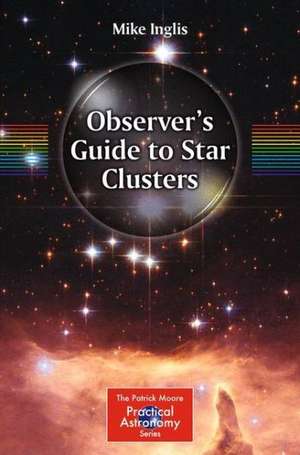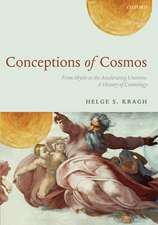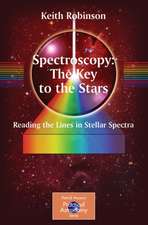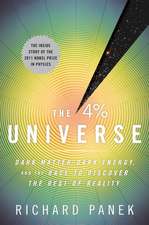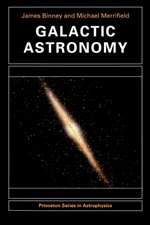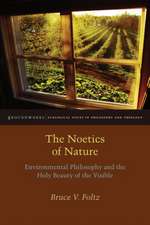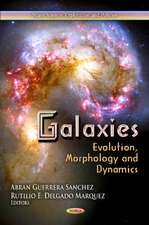Observer’s Guide to Star Clusters: The Patrick Moore Practical Astronomy Series
Autor Mike Inglisen Limba Engleză Paperback – 20 iul 2013
To be used as a self-contained reference, the book provides the reader with detailed and up-to-date coverage of objects visible with small-, medium-, and large-aperture telescopes, and is equally useful for simple and computer-controlled telescopes. In practice, GO-TO telescopes can usually locate clusters accurately enough to be seen in a low-magnification eyepiece, but this of course first requires that the observer knows what is visible in the sky at a given time and from a given location, so as to input a locatable object. This is where "The Observer's Guide to Star Clusters" steps in as an essential aid to finding star clusters to observe and an essential piece of equipment for all amateur astronomers.
Din seria The Patrick Moore Practical Astronomy Series
-
 Preț: 258.21 lei
Preț: 258.21 lei -
 Preț: 164.94 lei
Preț: 164.94 lei -
 Preț: 324.21 lei
Preț: 324.21 lei -
 Preț: 255.10 lei
Preț: 255.10 lei - 8%
 Preț: 581.98 lei
Preț: 581.98 lei -
 Preț: 159.16 lei
Preț: 159.16 lei -
 Preț: 282.38 lei
Preț: 282.38 lei -
 Preț: 308.55 lei
Preț: 308.55 lei -
 Preț: 309.87 lei
Preț: 309.87 lei -
 Preț: 332.98 lei
Preț: 332.98 lei -
 Preț: 276.91 lei
Preț: 276.91 lei -
 Preț: 243.94 lei
Preț: 243.94 lei -
 Preț: 183.40 lei
Preț: 183.40 lei -
 Preț: 378.09 lei
Preț: 378.09 lei -
 Preț: 302.20 lei
Preț: 302.20 lei -
 Preț: 210.01 lei
Preț: 210.01 lei -
 Preț: 212.68 lei
Preț: 212.68 lei -
 Preț: 271.39 lei
Preț: 271.39 lei -
 Preț: 252.91 lei
Preț: 252.91 lei -
 Preț: 281.95 lei
Preț: 281.95 lei -
 Preț: 289.85 lei
Preț: 289.85 lei -
 Preț: 218.84 lei
Preț: 218.84 lei -
 Preț: 282.38 lei
Preț: 282.38 lei -
 Preț: 128.86 lei
Preț: 128.86 lei -
 Preț: 301.10 lei
Preț: 301.10 lei -
 Preț: 204.78 lei
Preț: 204.78 lei -
 Preț: 307.44 lei
Preț: 307.44 lei -
 Preț: 303.07 lei
Preț: 303.07 lei -
 Preț: 258.83 lei
Preț: 258.83 lei -
 Preț: 155.25 lei
Preț: 155.25 lei -
 Preț: 193.97 lei
Preț: 193.97 lei -
 Preț: 208.26 lei
Preț: 208.26 lei -
 Preț: 279.09 lei
Preț: 279.09 lei -
 Preț: 303.51 lei
Preț: 303.51 lei -
 Preț: 277.54 lei
Preț: 277.54 lei -
 Preț: 208.51 lei
Preț: 208.51 lei -
 Preț: 214.86 lei
Preț: 214.86 lei -
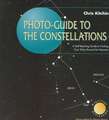 Preț: 304.58 lei
Preț: 304.58 lei -
 Preț: 220.57 lei
Preț: 220.57 lei -
 Preț: 157.32 lei
Preț: 157.32 lei -
 Preț: 275.98 lei
Preț: 275.98 lei -
 Preț: 288.98 lei
Preț: 288.98 lei -
 Preț: 261.49 lei
Preț: 261.49 lei -
 Preț: 279.09 lei
Preț: 279.09 lei -
 Preț: 160.82 lei
Preț: 160.82 lei -
 Preț: 327.01 lei
Preț: 327.01 lei -
 Preț: 254.90 lei
Preț: 254.90 lei -
 Preț: 304.38 lei
Preț: 304.38 lei -
 Preț: 256.84 lei
Preț: 256.84 lei
Preț: 326.17 lei
Nou
Puncte Express: 489
Preț estimativ în valută:
62.41€ • 65.16$ • 51.65£
62.41€ • 65.16$ • 51.65£
Carte tipărită la comandă
Livrare economică 05-19 aprilie
Preluare comenzi: 021 569.72.76
Specificații
ISBN-13: 9781461475668
ISBN-10: 146147566X
Pagini: 220
Ilustrații: XIII, 282 p. 69 illus.
Dimensiuni: 178 x 254 x 17 mm
Greutate: 0.52 kg
Ediția:2013
Editura: Springer
Colecția Springer
Seria The Patrick Moore Practical Astronomy Series
Locul publicării:New York, NY, United States
ISBN-10: 146147566X
Pagini: 220
Ilustrații: XIII, 282 p. 69 illus.
Dimensiuni: 178 x 254 x 17 mm
Greutate: 0.52 kg
Ediția:2013
Editura: Springer
Colecția Springer
Seria The Patrick Moore Practical Astronomy Series
Locul publicării:New York, NY, United States
Public țintă
Popular/generalCuprins
Introduction to Star Clusters.- How to observe and image star clusters.- How to use the star maps.- Constellations A-Z.
Notă biografică
Dr. Mike Inglis was born in Wales in the UK, but lives and works in the USA, where he is Professor of Astrophysics at Suffolk County Community College, State University of New York. He is a Fellow of the Royal Astronomical Society, NASA’s Solar System Ambassador, a Member of the American Astronomical Society, a Member of the Association for Astronomy in Education, and a Member of the Society of Popular Astronomy. He is the author of many books and papers including “Field Guide to Deep Sky Objects” (Springer, 2012, 2nd Edition), “An Observer’s Guide to Stellar Evolution” (Springer, 2003), “Astronomy of the Milky Way, Vol. I and II” (Springer, 2004), “Astrophysics is Easy (Springer, 2007). He is the Series Editor of Springer’s “Practical Astronomy Observing Guides.”
Textul de pe ultima copertă
This book is for amateur astronomers of all expertise, from beginner to experienced. It is intended to be used at the telescope – small, medium, or large – or even by an observer using binoculars or the naked eye. It is organized by constellation and will enable practical observers to locate the approximate positions of important star clusters in the 88 constellations from literally anywhere on Earth.
In practice, GO-TO telescopes can usually locate clusters accurately enough, but this, of course, first requires that the observer knows what is visible in the sky at a given time and from a given location, so as to input a locatable object! This is where the book becomes an essential aid to finding star clusters to observe. Observers who do not have computer-controlled telescopes can of course use the traditional “star-hopping” method to find specific objects, starting from the given reference stars.
The constellation maps in this book are in black and white, so that they can be read by the light of a red LED observer’s reading light. The clusters and their names/numbers are printed in bold black, against a “grayed-out” background of stars and constellation figures.
Used as a self-contained reference, Observer’s Guide to Star Clusters offers detailed and up-to-date coverage of these beautiful objects. This book will soon become an essential piece of equipment for you, as essential as your telescope!
In practice, GO-TO telescopes can usually locate clusters accurately enough, but this, of course, first requires that the observer knows what is visible in the sky at a given time and from a given location, so as to input a locatable object! This is where the book becomes an essential aid to finding star clusters to observe. Observers who do not have computer-controlled telescopes can of course use the traditional “star-hopping” method to find specific objects, starting from the given reference stars.
The constellation maps in this book are in black and white, so that they can be read by the light of a red LED observer’s reading light. The clusters and their names/numbers are printed in bold black, against a “grayed-out” background of stars and constellation figures.
Used as a self-contained reference, Observer’s Guide to Star Clusters offers detailed and up-to-date coverage of these beautiful objects. This book will soon become an essential piece of equipment for you, as essential as your telescope!
Caracteristici
Provides a comprehensive coverage for identifying and locating star clusters in all relevant constellations in the northern and southern hemispheres Affords a simple yet detailed means of locating star clusters quickly for any time or locations, without having to read through an index Easy to use at the telescope Includes supplementary material: sn.pub/extras
